British Prime Minister Boris Johnson has invited the leaders of Australia, India, and South Korea to the G7 Summit, which Britain is hosting this summer, marking the first time that the “D-10” grouping of democracies will meet at leaders level. The move is consistent with President-Elect Biden’s intention to strengthen democratic cooperation by organizing a Summit for Democracy after he takes office, the Atlantic Council reports:
The expansion of the G7 to a new D-10 could provide an influential forum for the US and its allies to coordinate strategies on a range of pressing global issues, from China and Russia, to technology norms and climate change. The meeting could serve as the first step toward permanent expansion to a D-10, which will require unanimous support among current G7 nations.
But a perverse effect of Trump’s term in power is that, by ruthlessly focusing on the national interest, he has encouraged other players – including Europeans – to concentrate more on protecting their own interests at the expense of focusing on the broader common interests of the democratic West, according to ECFR analysts Ivan Krastev and Mark Leonard. Although a majority of Europeans are happy with Biden’s election, many do not trust the American electorate not to vote for another Donald Trump in four years, they add.
A perverse effect of Trump’s term in power is that he has encouraged other players to concentrate more on protecting their own interests at the expense of focusing on the broader common interests of the democratic West. https://t.co/ELXZbn6cDS via @ecfr
— Democracy Digest (@demdigest) January 19, 2021
Can the U.S. still be described as ‘leader of the Free World’? CTV News asks.
Even if U.S. influence has waned, traditional allies are still looking to Biden to signal an American return to the liberal international order, said John Kirton, director of the G7 research group at the University of Toronto’s Munk School of Global Affairs and Public Policy.
“It’s not just that Biden has wind in his sails; he’s got a gale pushing him,” he said. “I think all of the democratic allies … are really willing to give America the benefit, give Biden the benefit of the doubt. They can’t afford to let Biden not succeed.”
The time is ripe for a global democracy summit. But such a forum should not be a purely inter-governmental affair, say analysts Staffan Lindberg and Julia Leininger. Even with an increasing number of autocracies, governments are not on their own in the struggle for democracy as during the Cold War. Civil societies have become powerful actors in both domestic and global politics, they write for the German Development Institute:
 Standing up for democracy today entails admitting that “the West” does not have all the solutions, and is not free of problems, they add. Earlier initiatives like the Community of Democracies, founded in 2000, focused on external threats to democracy without acknowledging hazards coming from within.
Standing up for democracy today entails admitting that “the West” does not have all the solutions, and is not free of problems, they add. Earlier initiatives like the Community of Democracies, founded in 2000, focused on external threats to democracy without acknowledging hazards coming from within.
The purpose of the incoming Biden administration’s proposed Summit for Democracy should be to promote a conversation about the shared challenges that all pluralist democracies confront as they work to put their ideals into practice and to build accountable, resilient institutions, argues Council on Foreign Relations expert Stewart Patrick. Such an agenda is likely to win support from the European Union, which recognizes its own vulnerability to the same “madness” that has afflicted America, he writes for World Politics Review:
To be sure, acknowledging that American democracy is a work in progress could create domestic political vulnerabilities for Biden. Some Republican politicians and right-wing media outlets may well slime the new president for overhyping America’s sins, just as they once castigated Barack Obama for, in their words, “apologizing” for the United States. Still, if there were ever a moment to argue that U.S. democracy is imperfect, that it requires constant vigilance to maintain, and that America is in no position to smugly lecture the world, this is surely it.
Biden’s team must also avoid trying to accomplish too much with a single summit—by seeking to establish a new strategic alliance or league of democratic states, for example, argue Carnegie analysts Frances Z. Brown, Thomas Carothers, and Alex Pascal. The United States should continue to participate in existing democratic groupings with well-defined parameters, such as the Quad (Australia, India, Japan, and the United States) in the Indo-Pacific, they write for Foreign Affairs:
It should also entertain the British idea of expanding the G-7 to a D-10 that includes Asia’s three most important democracies (Australia, India, and South Korea). But an attempt to forge a new, large-scale, open-ended democratic “alliance” would almost certainly fail given that the geopolitical and economic interests of a diverse group of democracies do not align well on many issues.
 What would be the purpose of a new alliance “of” democracies or an alliance “for” democracy? Institut Montaigne analysts Michel Duclos and Bruno Tertrais ask:
What would be the purpose of a new alliance “of” democracies or an alliance “for” democracy? Institut Montaigne analysts Michel Duclos and Bruno Tertrais ask:
Biden’s article in Foreign Affairs maintains a certain ambiguity between a defensive objective-regenerating democracy where it already exists-and a more offensive objective, which is to play off the opponents of democracy. …. The purpose thus appears to be primarily oriented towards the existing “free world.” However, Biden then proceeds to state that “…the United States will prioritize results by galvanizing significant new country commitments in three areas: fighting corruption, defending against authoritarianism, and advancing human rights in their own nations and abroad”.
Biden’s plans thus include the promotion of human rights not only within existing democratic nations but in all nations, they conclude.







